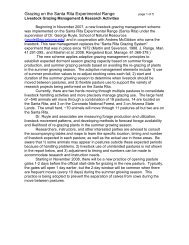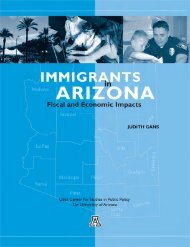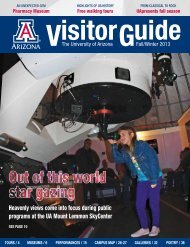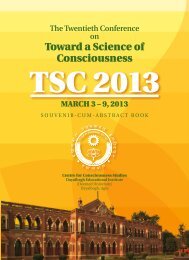CONSCIOUSNESS
Download - Center for Consciousness Studies - University of Arizona
Download - Center for Consciousness Studies - University of Arizona
- No tags were found...
You also want an ePaper? Increase the reach of your titles
YUMPU automatically turns print PDFs into web optimized ePapers that Google loves.
58 1. Philosophy<br />
37 The Alien Pure Consciousness (APC) problem Oded Maimon<br />
(Industrial Engineering, Tel Aviv University, Tel Aviv, Israel)<br />
The alien has logic potential as a human being, but without any data at all. That is he<br />
knows nothing (of what we consider knowledge): He does not have any opinion, does not<br />
know any language, etc. This alien comes to the earth and is exposed to infinite data (e.g. the<br />
internet), but stays by himself - without any ‘guidance’. What are the processes and transformation<br />
that the alien undergoes (if any)? This is the Alien Pure Consciousness (APC) problem.<br />
Can he learn? Does he learn? If yes, then what is his knowledge? Can we compare his<br />
knowledge, after a while, to the knowledge that a regular person has? This paper shows a<br />
process that solves the APC problem. This is a very relevant problem in today’s environment,<br />
where we have access to abundance of data (without proper introduction), and especially for<br />
kids. In this paper we show a mathematical model and algorithmic process for learning from<br />
scratch, without any supervision, but data dependent, to solve the APC problem. C5<br />
38 A Critique on Artificial Intelligence Model of Mind Rajakishore Nath<br />
(Department of Humanities and S, Indian Institute of Technology<br />
Bombay, Mumbai, Maharastra India)<br />
Computer and Mind are the two concepts that together define an independent discipline<br />
called Artificial intelligence (AI). Mind collectively refers to the aspects of intellect and<br />
consciousness manifested as combinations of thought, perception, memory, emotion, will,<br />
reason and imagination; mind is the stream of consciousness. It includes all of the brain’s<br />
conscious processes. Where as intelligence is one of the important properties of mind. In<br />
mid-twentieth century, the hypothesis, ‘a machine can think’ became very popular after, Alan<br />
Turing’s article on ‘Computing Machinery and Intelligence’. This hypothesis, ‘a machine can<br />
think’ established the foundations of artificial intelligence, and claimed that artificial intelligence<br />
has mind, with the power to compete with human beings. That is to say, an artificial,<br />
non-biological system could be a sort of thing that could give rise to mental activities. Thus<br />
artificial intelligence has emerged as a scientific programme in the twentieth century. In the<br />
first section, I shall show how consciousness is conceptualized in the domain of AI. The main<br />
aim of AI is not only to construct difficult programs to solve our day-to-day problems, but also<br />
to reproduce mentality in machines. It was claimed that all the mental qualities are ascribable<br />
to machines. My intention in this paper is to clarify consciousness from a subjective point of<br />
view. My claim is that consciousness cannot be fully represented in a mechanistic domain.<br />
There are subjective mental or conscious states, which can be seen in a first-person perspective<br />
of their proper understanding. P7<br />
39 A Logical Model of the Brain and Consciousness John Strozier (Science, Mathematics & Technol, Empire State College/SUNY, Sedona, AZ)<br />
We present a logical computational model of a brain and consciousness, complete with<br />
diagram and pseudocode; and discuss its consequences. We posit a real world out there that<br />
all animals must deal with in order to survive. Indeed, the simplest representation of the world<br />
as brain states of a given individual organism, i, at time t is: Bi = (1-Ki)^(-1)CiW where W is<br />
the sum total of the information comprising the real world at a given time, Ci the operator on<br />
the world that projects out whatever information about the world the senses can detect; and Ki<br />
is the operator on the brain that outputs the effects of that organism on the world. In general,<br />
Ci and Ki are different for each species and individual; having components in both genetic<br />
heredity and learning (where learning again has components in genetic heredity and learning,<br />
etc.).We agree with Pinker and others that the brain/consciousness is advantageously studied<br />
through its biological evolution. In one-celled animals; simple feedback chemical ‘circuits’<br />
monitor the concentrations of essential chemicals (sugar, proteins, water, etc.) in the cell.<br />
When these get outside their set-points, determined by biological evolution, movement is<br />
generated to get to a new location. The logic of single-celled animals is straightforward; but<br />
as animals become more complex, due to biological evolution, so does the brain; building up<br />
as a set of ‘modules’ (Pinker) that run in parallel and increasingly become more complex with<br />
multiple interconnections. We suggest that at a certain level of complexity, a ‘visual tableau’







